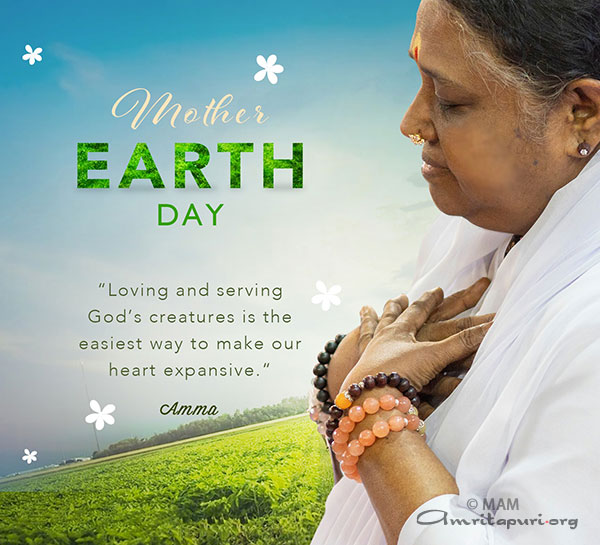“Nature is an indispensable part of life on Earth. Everything relies on nature to live. We are not different from nature; we are an interdependent part of it. Our lives depend on the well being of the whole. Therefore, it is one of our foremost duties to lovingly care for all living things.” –-Amma
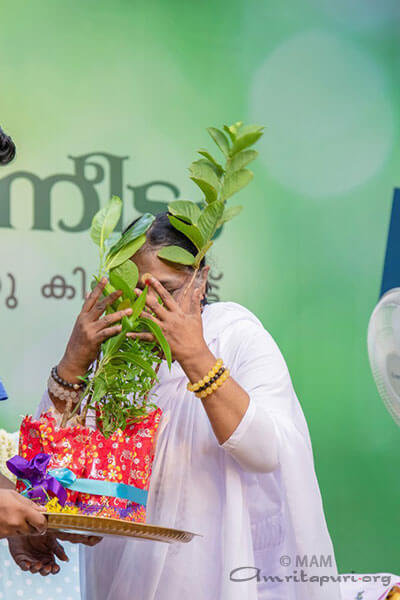
In 2019, Amma presented AYUDH Amritapuri members with fruit-tree saplings and bird feeders to be distributed amongst local households to provide shelter, food and water for birds. Amma said “Whether you are university students or schoolchildren, it is Amma’s dream and desire that all of you take part in this new initiative.” She spoke about the need to foster love for nature in the hearts of the younger generations.
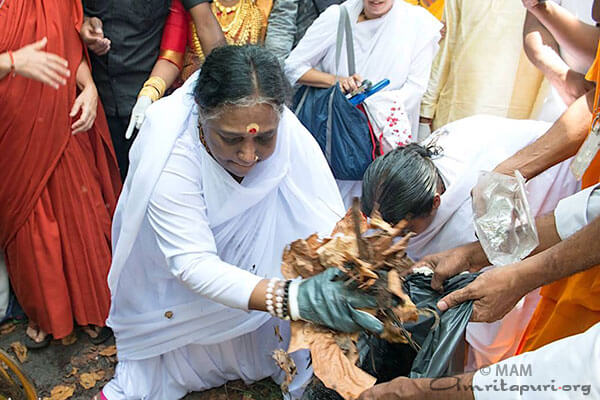
In support of the Swacch Bharat Abhiyan (Clean India Mission), Amma donated Rs. 100 Crore for the National Mission for Clean Ganga project. Immediately after the Swacchata Hi Seva event, a video conference with Prime Minister Narendra Modi, Amma herself began a clean-up of a 16 km stretch of the coastal belt near the Ashram, in 2018. Many years before Swachh Bharat even began, Amma had already organized & participated in national level community cleanup drives through the Amala Bharatam (Clean India) campaign.

Amrita Vishwa Vidyapeetham was awarded a UNESCO Chair for Experiential Learning for Sustainable Innovation & Development. The Chair supports the university’s mandate to strengthen sustainable development in villages across India. Students spend time alongside villagers to assess needs and create solutions to societal problems. Pictured here: Social work students from Ryerson University in Toronto, Canada work in rice paddies alongside women in Hadiabad, Bihar (2019)
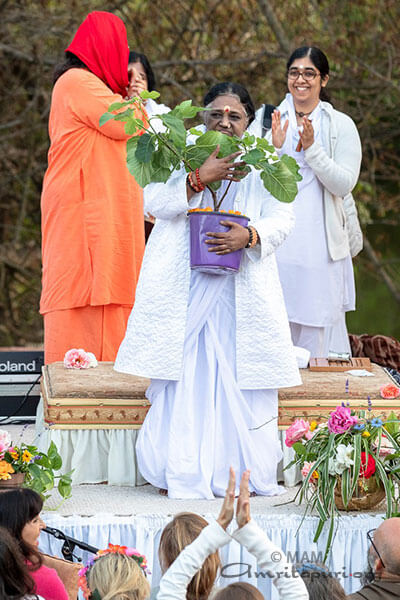
Once a barren landscape, MA Center San Ramon, Amma’s first US Ashram, is now a pure example of Amma’s vision to bring harmony to nature through sustainable and compassionate techniques for the cultivation of land and resources. Amma’s wish to plant 1000 fruit trees on the Ashram grounds was finally realized when she blessed the 1000th sapling after the question and answer session at the 2019 North American retreat.

Greenfriends is an international, volunteer-based movement that promotes environmental awareness and participation at the individual and community levels. Greenfriends is approaching it’s 20 year anniversary and has chapters all over the world.

In France, volunteers built a walk-in bee sanctuary that offers the educational experience of living with bees. These sustainable bee houses are built with mud, straw, an eco-green roof and walls inhabited by bee swarms. Many of Amma’s Ashrams have bee sanctuaries recognizing that bees play a vital role in our ecosystem.

Sustainable waste management plays a vital role in environmental preservation. The Amritapuri Ashram has 22 waste collection centres serving 5000 people per day.
Waste segregated into over 100 categories and 95% waste is recycled. Management. The whole operation is lovingly run by dedicated Ashram residents.

Organic waste is composted at a state of the art facility and 10-20 tons of waste per month is upcycled. The recycling center at Amritapuri, serves as an educational model of professional waste management.
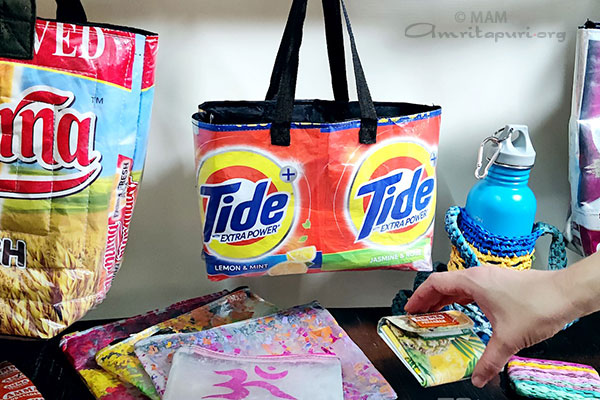
Inspired by Amma herself, volunteers at every level of Amma’s organizations strive for a “zero waste” approach toward material resources. Amrita Upcycling is a philosophy about love and care for nature and respect of the divine through conscious actions. The Amrita Upcycle project at Amritapuri teaches simple techniques that recycle plastic packaging into durable, fashionable products like bags, purses, mobile phone cases and more!

the Ashram has several large scale, organic farms, which are home to hundreds of varieties of plant species, ayurvedic herbs, fruits and flowers. Online courses & workshops are offered from Amritapuri, based on Amma’s teachings. They focus on current and ancient regenerative/organic agricultural practices.

Preserving heritage seeds is a grassroots approach to a healthy lifestyle. Amma has encouraged everyone to preserve traditional and native seed varieties as a way to deepen our connection with nature and strengthen the diversity and stability of our food systems. Ashram residents teach the step-by-step progression of seed preservation.

On World Nature Conservation Day in 2019, hundreds of people gathered to plant more than 100,000 seed balls in the Rajokri and Ghitorni forest areas (Delhi NCR area) AYUDH organized the planting drive as a way to take action for the city’s pollution problem.
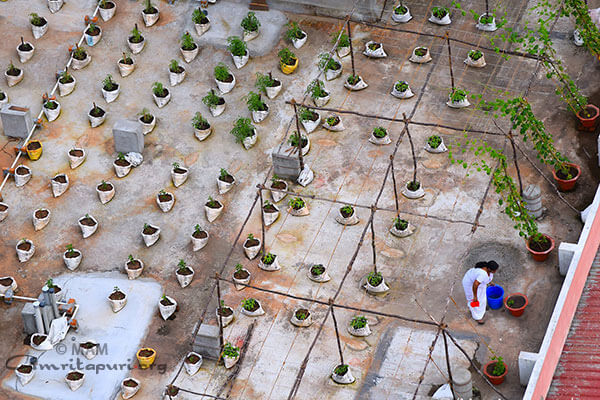
Amma feels strongly that everyone should be able to eat vegetables grown organically at least once a week, and that the act of growing these vegetables on one’s own is a practical step we can all take to help restore the lost harmony between humanity and nature. Inspired by this call, many Amritapuri Ashram residents have started cultivating organic rooftop gardens.
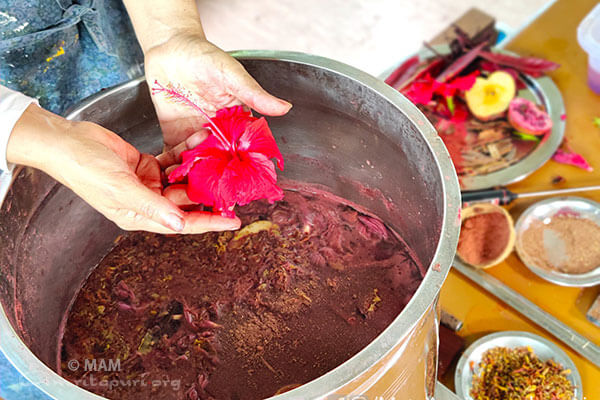
Amritapuri’s Saraswati garden is an ecological preserve that houses Kerala’s local biodiversity.
Residents teach the art of dyeing fabric using local flowers, fruits and medicinal plants. India’s ancient tradition of Ayurvastra (healthy cloth), is a technique that uses medicinal plants for dyeing and treating cloth.
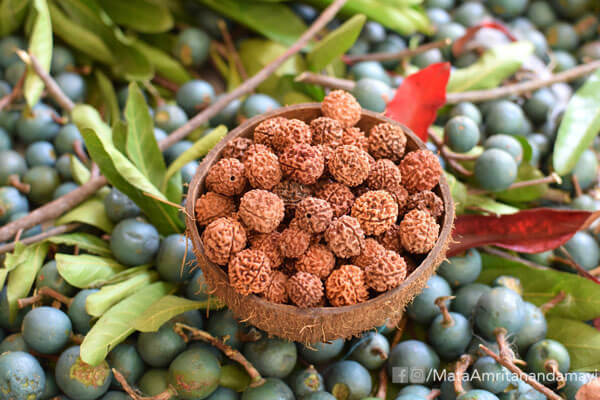
Rudrakshas are assosiated with Shiva. Inside the blue berry, is the rudraksha seed often used to make sacred malas (prayer beads).
Through patience and perseverance, the Amritaculture team has managed to grow over 400 rudraksha trees just in Amritapuri. In return, the trees currently give back about 50,000 rudraksha seeds per year.
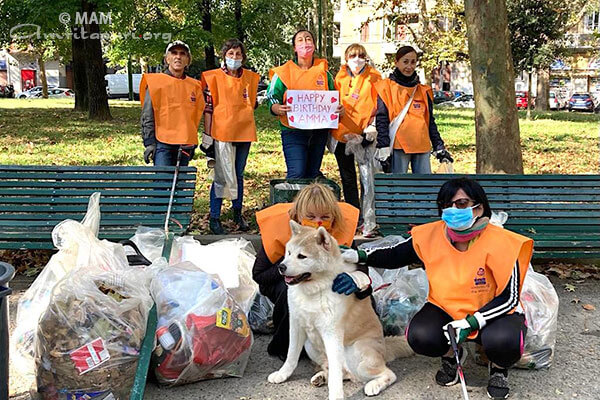
Amma Italia volunteers gathered on Amma’s birthday in 2020 to clean up urban areas. Inspired by Amma’s tireless example of service, these volunteers regularly take part in community events like this, even during the pandemic.

As a member organization of the United Nations Trillion Tree Campaign, the Mata Amritanandamayi Math has organized the planting of more than a million trees globally. Throughout the world, Amma’s centers are working to become local models of sustainable living.

Sustainable living and conservation techniques are incorporated in daily life in Amritapuri. At the Ecology Center, residents practice and they teach techniques in making natural products through sustainable and ethical methods.

At the Eco Center, ethically sourced & locally grown cacao beans from tribal areas of Idukki are being packed in refillable bottles.
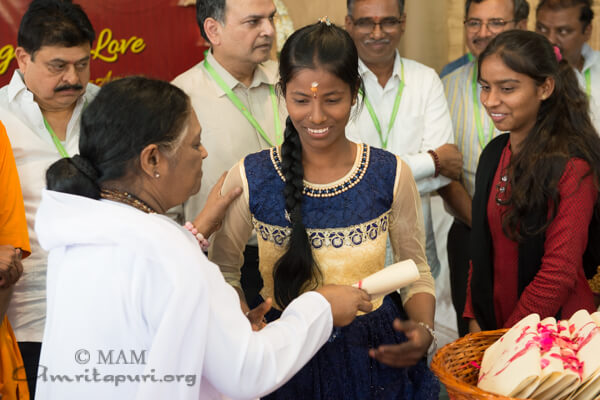
When Amma began the production of reusable cloth menstrual pads, it was with a holistic vision for both Mother Earth and its girls and women. Saukhyam is a reusable pad made from natural materials that are practical, cost-effective and minimize pollution. In addition, Saukhyam is manufactured by women’s self-help groups who are part of the Amrita SeRVe village project.
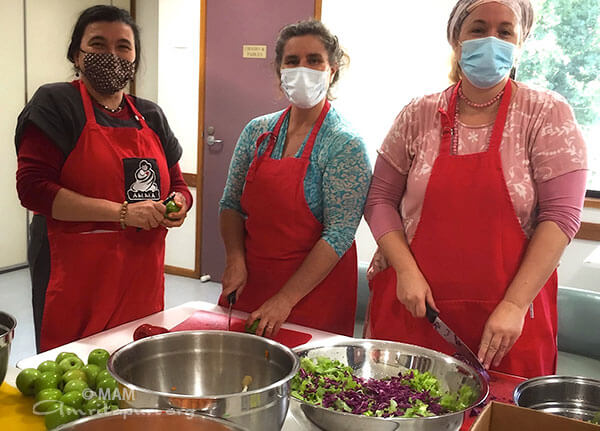
Grow & Serve! Amma says: “Everyone in the world should eat to their fill.” Mother’s Kitchen in Queensland Australia provides free wholesome meals for those in need. The meals are lovingly made with delicious organic produce locally grown from the Greenfriends Community Garden. The Sunshine Coast satsang (Amma Australia) created the garden for satsang members to come together, plant, harvest and then cook meals for underserved people. Many hearts and hands come together to share nature’s bounty with all.

